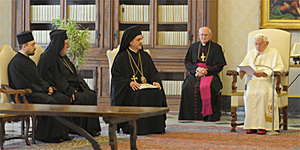You can count on a delegation from the Ancient See of Constantinople visiting Rome and the Holy Father on the Solemnity of Saints Peter and Paul. Most years a small of group of bishops and archimandrites designated by the Ecumenical Patriarch descend on Rome to pray at the Tombs of Peter and Paul, to attend the Mass with the Pope and those receiving the pallium and to exchange ideas with the Pope. Lunch in the Apostolic Palace is regular. In an editorial by L'Osservatore Romano, Pope Benedict talks more openly about the goal of these ecumenical exchanges. Eucharistic sharing is still impossible, but the hope and identifiable goal is that one day --and one hopes it happens in the next 50 years-- that we can be in full visible communion. The editorial is below with my emphasis.

The Second Vatican Council, the 50th anniversary of whose opening is to be celebrated next 11 October, has marked "a new and important phase in relations" between Catholics and Orthodox. In recognizing this the Pope expressed the hope that "progress may also be made in the current phase", while waiting "to arrive soon at the blessed day when we will be able to share in the Eucharistic banquet".
The traditional meeting with the Delegation of the Ecumenical Patriarchate of Constantinople, received in audience on Thursday morning, 28 June, on the eve of the Feast of Sts Peter and Paul, was an opportunity for Benedict XVI to recall the importance of the Council in the development of ecumenical dialogue. It was also an opportunity to remember, in particular, the "passion for the unity of the Church" which inspired the Ecumenical Patriarch Athenagoras and the Pontiffs, John XIII and Paul VI, who "made themselves champions of courageous projects that paved the way to renewed relations between the Ecumenical Patriarchate and the Catholic Church".
The activity of the present Ecumenical Patriarch follows in these tracks. "It is a cause of special joy to me to note that His Holiness Bartholomew I is following with fresh fidelity and fruitful creativity the way marked out by his predecessors, Patriarch Athenagoras and Patriarch Dimitrios, and is distinguishing himself in the international arena for his openness to inter-Christian dialogue and for his commitment to the service of Gospel proclamation in today's world".
For this very reason the Pope asked the members of the Delegation to convey to the Patriarch and to the Holy Synod "sentiments of fraternal affection and deep gratitude", raising their voices in the hymn of praise "to God for the journey of peace and reconciliation that he has granted us to make together".
For Benedict XVI the celebration of the Feast of Sts Peter and Paul will offer, precisely, "the possibility of thanking the Lord together for the extraordinary works he has accomplished and continues to accomplish through the Apostles in the life of the Church"; in the awareness that their preaching "forms the solid, everlasting basis on which the Church is built" and "it is in fidelity to the deposit of the faith transmitted by them that we find the roots of the communion between us which we are already experiencing".


Leave a comment